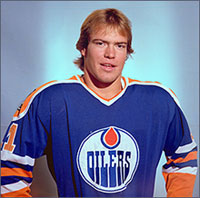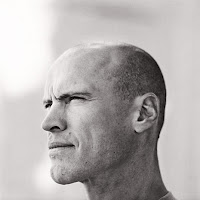Stephen Covey groups his leadership habits into two groups: independence & interdependence. We all begin life as dependents. As we grow into our teen years, we begin to establish our independence (learning to drive, dating, renting an apartment, etc). And then hopefully, if all goes well, we become more interdependent (working in teams, starting a family, participating in the community).
Covey believes the first three, as a set, are a prerequisite for the next three, or the independence stage, like in life itself, is the foundation for interdependence. It is through this natural process that leaders such as Mark Messier also start their way down the road of becoming captains, coaches or managers.
But what sets the elite leaders apart is something Covey discusses in the chapter on Habit #2, Begin with the End in Mind. And that is the mission writing process. Not everyone does this in a formal way. But the best leaders do typically have a vision or goal that that over time becomes crystalized in their minds like written mission.
Covey's mission statement recommendation though, goes beyond just goals. He believes these goals need to be guided by one's conscience in order for those goals to have an optimal effective on one's circle of influence. Thus, our conscience will reveal in our mission statement, our ethic or moral code for our personal life or professional life -- optimally both.
In hockey, the goal is obviously winning the Stanley Cup. Many kids dream of one day hoisting the big silver mug over their heads as well. Perhaps Messier was one of those children as well, but even he had no idea of the level of success he would achieve:
So what set Messier apart allowing him achieve unprecedented success in the modern era. Lets see what else he had to say:
Note that he demonstrates gratitude/humility by acknowledging his teammates and coaches. He talks about the journey in addition to the goal. He talks about the Stanley Cup as a collective goal or vision.
These were elements of his unwritten mission: an authentic vision that included both the goal (cup) and principles (team work, hard work and gratitude) that guided him throughout his professional journey.
Covey's Habit #1, being proactive, is essentially the opposite of being reactive. It's important because top performance requires athletes to ignore a lot the nice things in life in order to focus on their sport. For example when others were going to the movies, Gretzky was skating in his backyard rink fostering his hockey sense as an 7 year old, sometimes all alone.
Another example is eating well in order for the nutrition to heal the body especially since hockey is such a physically punishing game. This is especially as the athlete gets older.
So the point is that before one simply reacts to stimuli without thinking, the ability to pause between stimulus and response needs to be developed. That pause though to be meaningful requires filling by something meaningful. So that the eventual decision or action is based on the authentic vision (goals & principles).
That honed pause is quite powerful as it has the potential to create a machine out of the person. That person if pre-programmed with ethical principles then would then logically make ethical decision with the power to eventually propel him to new heights, but just as importantly, it could move others to better themselves, or just simply improve them on its own because of its ethical nature.
Thus, if that pause filled by principled thought, the result will be principled action! That's being proactive. What we sew is what we reap. Hence, optimal habit performance requires ethical vision.
Habit 3 is very much the same with regard to being more effective with a character exuding mission statement supporting it. Habit 3 is of course putting first things first. First things are those that intersection at the highest levels of urgency & importance. The important axis should be heavily influenced by what's in your vision. If the vision is a high character mission statement, then if first things are indeed done, many great deeds will be done around the world every day.
In Habit 4, Think win-win, this is the first habit that really puts a focus on other people in addition to oneself. If you are a credible person of impeccable moral character, people will trust you more naturally and you will both be able to get to win-win agreements more often. It's a no brainer.
With Habit 5, seek to understand first, before trying to be understood. Mutual understanding is much more easily achieved if their is mutual trust. So like win-win relationships, a person of high moral character will naturally be more trustworthy and have many more opportunities to participate in high quality relationships, which increase the chances of success, since more can be accomplished by groups than by individuals.
And Habit 6, Synergy is sort of the natural almost automatic result of high character enabled habits 4 & 5. Habit 7, renewal, well similar to habit 3, if a high character mission statement is at the core of a person's priority list, well just as good decisions will result, so to will good self development activity decisions.
It's that combination of goal & principles that will propel one to make the right decisions when the pressure to make the wrong decision are so great. When one avoids the pitfalls and imaginary shortcuts, longterm success is almost guaranteed.
 |
| Mark Messier & Hart Trophy |
But what sets the elite leaders apart is something Covey discusses in the chapter on Habit #2, Begin with the End in Mind. And that is the mission writing process. Not everyone does this in a formal way. But the best leaders do typically have a vision or goal that that over time becomes crystalized in their minds like written mission.
Covey's mission statement recommendation though, goes beyond just goals. He believes these goals need to be guided by one's conscience in order for those goals to have an optimal effective on one's circle of influence. Thus, our conscience will reveal in our mission statement, our ethic or moral code for our personal life or professional life -- optimally both.
In hockey, the goal is obviously winning the Stanley Cup. Many kids dream of one day hoisting the big silver mug over their heads as well. Perhaps Messier was one of those children as well, but even he had no idea of the level of success he would achieve:
"Growing up, watching Hockey Night in Canada every Saturday night with my family, I never dreamed I would hoist the Stanley Cup above my head six times."
So what set Messier apart allowing him achieve unprecedented success in the modern era. Lets see what else he had to say:
"Throughout my career, I have been fortunate to have played with and for some of the game’s greatest players and coaches. Because of this, I have also been able to achieve many individual accomplishments. But for me, it is and has always been about the team, the journey and the final collective achievement of one singular goal: the Stanley Cup."
Note that he demonstrates gratitude/humility by acknowledging his teammates and coaches. He talks about the journey in addition to the goal. He talks about the Stanley Cup as a collective goal or vision.
These were elements of his unwritten mission: an authentic vision that included both the goal (cup) and principles (team work, hard work and gratitude) that guided him throughout his professional journey.
Covey's Habit #1, being proactive, is essentially the opposite of being reactive. It's important because top performance requires athletes to ignore a lot the nice things in life in order to focus on their sport. For example when others were going to the movies, Gretzky was skating in his backyard rink fostering his hockey sense as an 7 year old, sometimes all alone.
Another example is eating well in order for the nutrition to heal the body especially since hockey is such a physically punishing game. This is especially as the athlete gets older.
So the point is that before one simply reacts to stimuli without thinking, the ability to pause between stimulus and response needs to be developed. That pause though to be meaningful requires filling by something meaningful. So that the eventual decision or action is based on the authentic vision (goals & principles).
That honed pause is quite powerful as it has the potential to create a machine out of the person. That person if pre-programmed with ethical principles then would then logically make ethical decision with the power to eventually propel him to new heights, but just as importantly, it could move others to better themselves, or just simply improve them on its own because of its ethical nature.
Thus, if that pause filled by principled thought, the result will be principled action! That's being proactive. What we sew is what we reap. Hence, optimal habit performance requires ethical vision.
Habit 3 is very much the same with regard to being more effective with a character exuding mission statement supporting it. Habit 3 is of course putting first things first. First things are those that intersection at the highest levels of urgency & importance. The important axis should be heavily influenced by what's in your vision. If the vision is a high character mission statement, then if first things are indeed done, many great deeds will be done around the world every day.
In Habit 4, Think win-win, this is the first habit that really puts a focus on other people in addition to oneself. If you are a credible person of impeccable moral character, people will trust you more naturally and you will both be able to get to win-win agreements more often. It's a no brainer.
With Habit 5, seek to understand first, before trying to be understood. Mutual understanding is much more easily achieved if their is mutual trust. So like win-win relationships, a person of high moral character will naturally be more trustworthy and have many more opportunities to participate in high quality relationships, which increase the chances of success, since more can be accomplished by groups than by individuals.
And Habit 6, Synergy is sort of the natural almost automatic result of high character enabled habits 4 & 5. Habit 7, renewal, well similar to habit 3, if a high character mission statement is at the core of a person's priority list, well just as good decisions will result, so to will good self development activity decisions.
It's that combination of goal & principles that will propel one to make the right decisions when the pressure to make the wrong decision are so great. When one avoids the pitfalls and imaginary shortcuts, longterm success is almost guaranteed.








